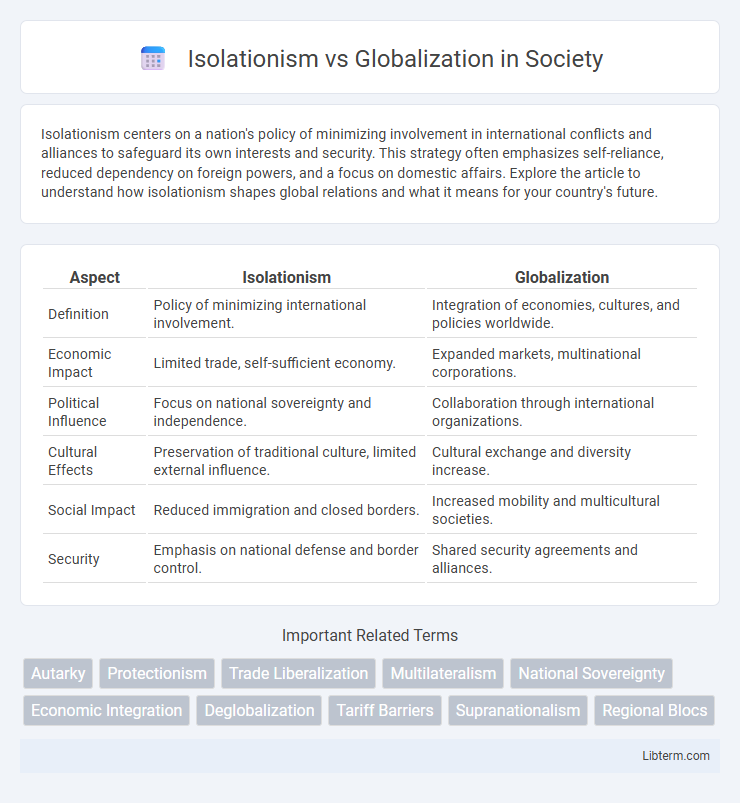Isolationism centers on a nation's policy of minimizing involvement in international conflicts and alliances to safeguard its own interests and security. This strategy often emphasizes self-reliance, reduced dependency on foreign powers, and a focus on domestic affairs. Explore the article to understand how isolationism shapes global relations and what it means for your country's future.
Table of Comparison
| Aspect | Isolationism | Globalization |
|---|---|---|
| Definition | Policy of minimizing international involvement. | Integration of economies, cultures, and policies worldwide. |
| Economic Impact | Limited trade, self-sufficient economy. | Expanded markets, multinational corporations. |
| Political Influence | Focus on national sovereignty and independence. | Collaboration through international organizations. |
| Cultural Effects | Preservation of traditional culture, limited external influence. | Cultural exchange and diversity increase. |
| Social Impact | Reduced immigration and closed borders. | Increased mobility and multicultural societies. |
| Security | Emphasis on national defense and border control. | Shared security agreements and alliances. |
Introduction to Isolationism and Globalization
Isolationism refers to a national policy of avoiding involvement in international economic and political relations, emphasizing self-sufficiency and minimal foreign interaction. Globalization describes the interconnectedness and integration of economies, cultures, and political systems through trade, communication, and technology advancements. These contrasting approaches significantly shape global economic policies, diplomatic strategies, and cultural exchanges.
Historical Origins of Isolationism
Isolationism traces its roots to early American foreign policy in the late 18th and early 19th centuries, particularly the Monroe Doctrine of 1823, which aimed to limit European interference in the Western Hemisphere. This doctrine reflected a growing preference for avoiding entangling alliances and extensive involvement in global conflicts. The policy further solidified during the interwar period of the 20th century when the United States sought to prioritize domestic interests over international engagement.
The Rise of Globalization
The rise of globalization is characterized by increased interconnectedness through trade, communication, and technology, driving significant economic growth and cultural exchange worldwide. Multinational corporations and international organizations facilitate cross-border collaboration, promoting innovation and market expansion. However, this phenomenon also intensifies competition and challenges national sovereignty, stirring debates over isolationism as nations weigh the benefits and risks of global integration.
Key Differences: Isolationist vs Globalist Policies
Isolationist policies prioritize national sovereignty, limiting foreign trade and immigration to protect domestic industries and culture. Globalist policies emphasize international cooperation, open markets, and multicultural integration to foster economic growth and cross-border collaboration. Key differences lie in economic openness, diplomatic engagement, and cultural exchange approaches.
Economic Impacts of Isolationism
Economic impacts of isolationism include reduced international trade, leading to decreased market access and limited foreign investment opportunities. Isolationist policies often result in higher production costs due to lack of competitive pressures and restricted access to global supply chains. Consequently, economic growth may slow, with domestic industries facing inefficiencies and reduced innovation.
Economic Benefits and Challenges of Globalization
Globalization promotes economic growth by expanding markets, increasing trade, and enabling access to diverse resources and technologies, which drives innovation and productivity. However, it also presents challenges such as income inequality, job displacement in vulnerable industries, and increased economic interdependence that can amplify the impact of global financial crises. Countries experience a complex balance between benefiting from global integration and managing the disruptions it brings to local economies and labor markets.
Social and Cultural Effects: Insularity vs Integration
Isolationism fosters social insularity by limiting cultural exchange, which often results in homogeneous societies with limited exposure to diverse perspectives. Globalization promotes cultural integration, enhancing multiculturalism and cross-cultural understanding through increased interaction and communication among different nations. The social effects of globalization include greater inclusivity and the blending of traditions, while isolationism tends to preserve distinct cultural identities but may hinder social progress and innovation.
National Security Perspectives
Isolationism prioritizes national security by minimizing foreign entanglements and reducing exposure to international threats, aiming to control borders and maintain sovereignty. Globalization, while fostering economic interdependence and international cooperation, introduces vulnerabilities such as cyberattacks, transnational terrorism, and supply chain disruptions that challenge traditional security measures. Balancing these approaches is critical for governments to protect national interests while engaging in global security frameworks.
Case Studies: Countries Embracing Each Approach
China exemplifies globalization through its extensive participation in international trade, foreign direct investment, and global supply chains, driving rapid economic growth and technological advancement. Conversely, North Korea's isolationism, characterized by strict border controls and limited foreign interaction, results in economic stagnation and limited access to global markets. Comparative analysis reveals how globalization fosters innovation and economic integration, while isolationism prioritizes sovereignty and self-reliance at the cost of international collaboration.
The Future: Balancing Isolationism and Globalization
The future of international relations hinges on striking an optimal balance between isolationism and globalization, ensuring national sovereignty while embracing global interdependence. Emerging technologies and climate change demand collaborative global solutions, yet rising protectionism highlights the need for selective engagement policies. Strategic diplomacy and adaptive economic frameworks will play crucial roles in harmonizing domestic interests with global responsibilities.
Isolationism Infographic

 libterm.com
libterm.com